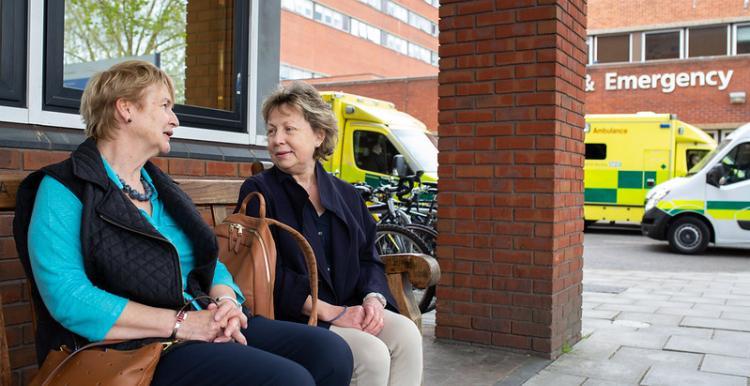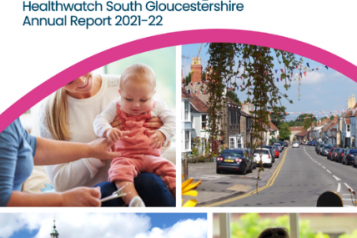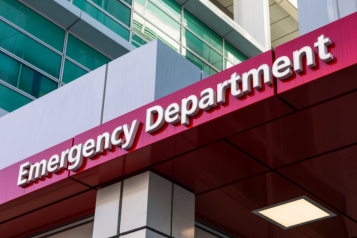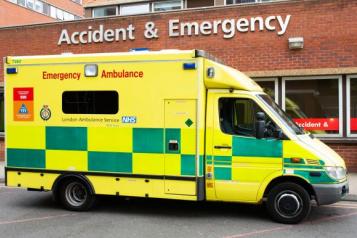Healthwatch discusses Covid-19 pressures on BRI's A&E department on Radio Bristol

Healthwatch Bristol, North Somerset, South Glos Area Manager, Vicky Marriott, talked to BBC Radio Breakfast show host Claire Cavanagh about how the hospital is facing big challenges meaning patients may have up to 12 hour waits to get seen sometimes. Staff are also facing pressures from abusive and aggressive staff, the Care Quality Commission report found, after visiting the service last month.
Vicky told the programme that Healthwatch BNSSG will keep abreast of the situation to inform patients in the future of how the Trust will address these concerns and meet national guidelines on waiting times. Changes have already been made to boost staff security and CCTV coverage.
She said: “The report was snapshot of one of the busiest times in terms of capacity at the BRI last month. It is a well-respected hospital trust that has been put under enormous pressure. A lot of staff might be ill themselves with Covid-19 and forced to take time off or self isolate as well as there being problems with recruitment. As a result, patients are not moving through services easily and the hospital is less likely to send people home or into homes meaning a lack of beds."
The general rating for the A&E service is 'requires improvement', which remains unchanged.
The CQC raised the following issues
- Inspectors had serious concerns about the growth in violence and aggression to staff from patients and staff felt they were not adequately trained and protected.
- The service did not have enough medical staff to meet the recommended guidance for the size of the department.
- Although efforts had been made to protect patients and staff from infection during the COVID-19 pandemic, there were some lapses in infection prevention and control practices that needed addressing. For example, in one of the waiting areas, some seats were torn, so they could not be cleaned properly.
- Patients did not always receive care and treatment promptly in a time considered to be safe and responsive to their needs. This was due to pressure from high demand, COVID-19 restrictions, a lack of beds in the rest of the hospital and patients being more unwell.
- Patient handover from ambulance crews and waiting-time performance for onward admission to the hospital was worse than NHS national standards. However, staff were actively looking for improvements and short and long-term solutions, both internally and externally with system partners
- Although leaders and teams identified and escalated relevant risks and issues and identified actions to reduce their impact, these were not always revisited in times of crisis.
- There was a perception from staff in the emergency department of limited visibility from the trust executive team and their recognition, understanding and support.
However, there were many positive findings to report:
- Leaders in the emergency department demonstrated the skills and abilities to run the service. They understood and managed the priorities and issues the service faced. They were visible, supportive, caring and approachable in the service for patients and staff.
- Staff understood how to protect patients from abuse and acted on any concerns. They recognised when abuse might be occurring and were trained in how to deal with their concerns to keep patients safe.
- Staff kept detailed and comprehensive records of patients’ care and treatment. Records were clear, up to date, stored securely and easily available to all staff providing care.
- Patients had an assessment of their infection risk and other clinical risks on arrival at the department. The department had a system for monitoring patients who were either at risk or found to be deteriorating. This included patients who were waiting on ambulances to be admitted to the department when demand was high or patient flow out of the department was blocked or slow.
- The pressures of COVID-19 meant the service struggled at times to have enough nursing staff, but measures were taken to ensure staff were brought in where possible to reach safe levels. This was addressed and reviewed on a regular basis by the senior nursing team.
- Staff in the department felt respected, supported and valued by their colleagues. They were focused on the needs of patients receiving care. There were strong examples of staff feeling able to speak up and raise concerns without fear.
Assaults on staff are to be condemned, patients going into A&E have high needs including some with serious mental health needs and limited community services for them.


